by Evan Randolph
The
Return of Athena--- reclaiming our universal protectress
CONSTANTINE'S TRINITY DOCTRINE INCORPORATED ATHENA AS THE HOLY SPIRIT
 Constantine
the Great (272-372 CE) believed the Palladium (a statue of
Athena) protected Rome.
Constantine
the Great (272-372 CE) believed the Palladium (a statue of
Athena) protected Rome.
Constantine "diminished none of the priveleges
of the sacred virgins---" Quote from Symmachus references
the late emporer Constantine's policy. See footnote 1
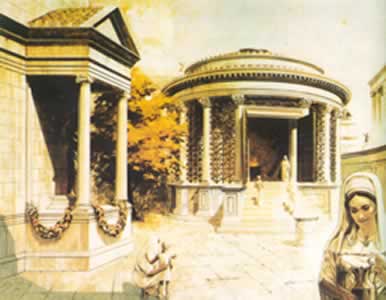
The circular Temple of Vesta- The Ancient City,
Peter Connolly & Hazel Dodge, Oxford Press, p. 172
The priestly office of the College of Vestal Virgins was created by
the second King of Rome. The Vestal Virgins
guarded the Palladium and kept the sacred fire burning. (see
footnote 2)
The Palladium was an image of Pallas Athena
on which the safety of the city depended (see footnote
3),
In Greek & Roman mythology, Odysseus and Diomedes stole the Palladium
from Troy and thus
defeated the city. (see footnote 3)
The College of Vestal Virgins ended in 391 CE, when disbanded by Theodosius
I. (see footnote 2)
Shortly thereafter, in 410 CE- the Visigoths sacked Rome (see footnote
4)
Constantine
honors Athena & Nike by placing them above his army on his Arch
commemorating his victory. Constantine defeated Maxentius
at Milvan Bridge in 312 CE. The Arch of Constantine was erected in
315 CE to celebrate this victory. The medallions and copy on this
Arch show Constantine's appreciation of the support of Athena &
Nike in his victory. (see footnote 5) [THIS IS A NEW FINDING-
NOT LISTED ON GOOGLE]
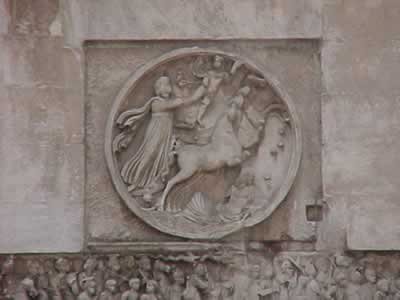
Athena
in chariot with Nike above rising above opposing force. This
medallion appears on Constantine's Arch
directly above scene of Constantine's army leaving Rome to meet Maxentius.
(see footnote 6)
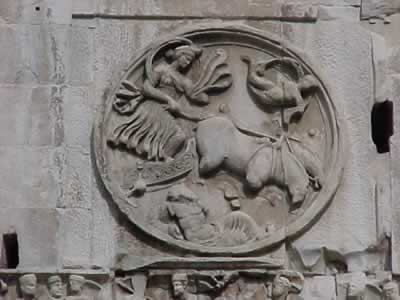
Athena in chariot with Nike above coming down on opposing
force. This medallion appears
directly above scene of Constantine's army after victory entering
Rome in triumph. (see footnote 6)
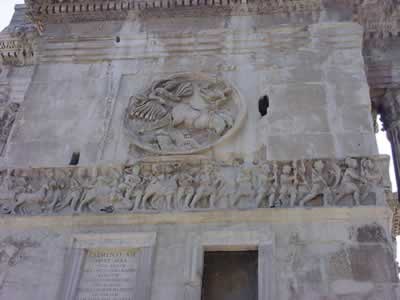
Here is the complete
scene showing Athena & Nike directly above Constantine's
army
entering Rome in triumph, Constantine in his chariot on the left.
(see footnote 7)
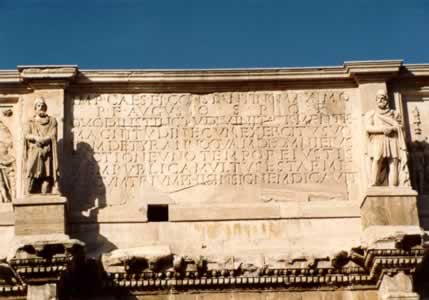
Constantine
honors Athena goddess of wisdom when he states on his Arch
(lines 3 & 4 above):
"...quod instinctu
divinitatis mentis magnitudine..."
this translated: "...since
through divine inspiration and great wisdom..."
(for inscription- see footnote 8, translation- see footnote 9)
In
330 CE Constantine moved his seat of government from Rome to
Byzantium, later called Constantinople. (see footnote
10)
Constantine the Great erected the first church of Hagia
Sophia (Divine Wisdom) in Byzantium.(see footnote 11)
Few structures remain of Constantine's Byzantium except a huge column
which he erected.(see footnote 12)
This column stands 120 feet high. Constantine topped it with a colossal
bronze statue of Apollo, supposedly the work of Phidias. Underneath
this pillar, it is said that Constantine
had buried the Palladium which he had removed from Rome.
(see footnote 13)

Constantine's 120 foot column in Constantinople with the Palladium
buried underneath. (see footnote 14)
Constantine
in 325 CE presided over the Council of Nicea. The significant
result of this Council was the adoption of the doctrine of the Trinity.
Christianity used the thinking of Plato to formulate its Trinity
doctrine. (see footnote 15)
As the learned trinitarian historian Mosheim states concerning Origen
and the Platonizing movement 200-250CE:
"A new class of philosophers had grown up in Egypt ...they much
preferred Plato, and embraced most of his dogmas concerning
God, the human soul, and the universe." (see footnote 15)
"The Christian bishops introduced, with but slight alterations,
into the Christian worship, those rites and institutions by which
formerly the Greeks and Romans and others had manifested their piety
and reverence toward their imaginary deities; supposing that the people
would more readily embrace Christianity if they perceived the rites
handed down to them from their fathers still existing unchanged among
the Christians, and saw that Christ and the martyrs were worshipped
in the same manner as formerly their gods were." (see footnote
15)
"There was, accordingly, little difference in these times between
the public worship of the Christians and that of the Greeks and Romans."
(see footnote 15)
"It will be noted ... that the most distinguished "Christian"
teachers of the 4th century looked to Origen and the Platonic
philosophy as their model. Any doctrines therefore - such
as the Trinity - formulated at this time are bound to be more
pagan than Christian." (see footnote 15)
Plato speaks of 3 specific Gods--
We read in Plato's Euthydemus in a dialog between Socrates and Dionysodorus:
"No matter, said Dionysodorus, for you admit that you have
Apollo, Zeus, and Athene.
Certainly, I said.
And they are your Gods, he said.
Yes, I said, my lords and ancestors." (see footnote 16)
Therefore Plato identifies Zeus,
Apollo & Athena as his Trinity.
Constantine's
Holy Spirit was gender neutral, allowing for a feminine third member
of the Trinity--We note in the Council of Nicea 325 CE
and in the 2nd ecumenical Council of Constantinople 381 CE that the
Holy Ghost/Holy Spirit was of neutral gender---here is the 381 CE
copy (see footnote 17):
"And in the Holy Spirit, the Lord, the
Giver of Life,
Who proceeds from the Father,
Who with the Father and the Son is equally worshipped and glorified,
Who spoke by the Prophets."
Here is the
exposition of the 150 fathers at the 2nd Council 381 CE (see
footnote 18):
"And in the Spirit, the holy, the lordly
and life-giving one, proceeding forth from the Father, co-worshipped
and co-glorified with Father and Son, the one who spoke through the
prophets; in one, holy, catholic and apostolic church."
It
was not until 589 CE at the Council of Toledo that the Holy Spirit
was defined as masculine and the filoque clause added. The Eastern
Churches did not agree with this change (see footnote 19):
"We believe in the Holy Spirit, the Lord, the giver of life,
who proceeds from the Father and the Son.
With the Father and the Son He is worshiped and glorified.
He has spoken through the Prophets."
Evidence
that the Holy Spirit is feminine:
 Gospel according to the Hebrews (in Origen, Commentary on John 2:12
and Homily on Jeremiah 15:4)--And if any accept the Gospel of the
Hebrews, here the Savior says: "Even
so did my mother, the Holy Spirit, take me by one of my hairs, and
carry me to the great Mount Tabor." Jerome also records
these words in Latin in his commentaries on Micah 7:6, Isaiah 40:9ff.,
and Ezekiel 16:13.
(see
footnote 20).
Constantine's historian Eusebius in 324 CE explains the Gospel of
Hebrews
is one of the disputed books but "known to most churchmen."
(see
footnote 21)
Gospel according to the Hebrews (in Origen, Commentary on John 2:12
and Homily on Jeremiah 15:4)--And if any accept the Gospel of the
Hebrews, here the Savior says: "Even
so did my mother, the Holy Spirit, take me by one of my hairs, and
carry me to the great Mount Tabor." Jerome also records
these words in Latin in his commentaries on Micah 7:6, Isaiah 40:9ff.,
and Ezekiel 16:13.
(see
footnote 20).
Constantine's historian Eusebius in 324 CE explains the Gospel of
Hebrews
is one of the disputed books but "known to most churchmen."
(see
footnote 21)
 Jesus indicates the Spirit is feminine--- In response to a question
from Nicodemus who asked “ But how is
it possible for a man to be born when he is old? Can he enter his
mother’s womb a second time and be born?” -NEB,
John III: 4.
Jesus indicates the Spirit is feminine--- In response to a question
from Nicodemus who asked “ But how is
it possible for a man to be born when he is old? Can he enter his
mother’s womb a second time and be born?” -NEB,
John III: 4.
Jesus responds: “ No one can enter the
kingdom of God without being born from water and spirit. Flesh can
give birth only to flesh; it is spirit that gives birth to spirit.”
-NEB, John III: 5-6.
 But She -the Spirit - the Paraclete whom He-will-send to you- my Father
- in my name - She will teach you every-thing; She will remind you
of that which I have told you.
But She -the Spirit - the Paraclete whom He-will-send to you- my Father
- in my name - She will teach you every-thing; She will remind you
of that which I have told you.
In the most ancient of the rare Old Syriac copies, the Siniatic Palimpsest
(see footnote 22)
 “the
Spirit, in Hebrew, was feminine ( rouach ).--- The Syriac Fathers,
in whose language ‘Spirit’ was feminine, went so far as
to call it our Mother.”---The Seat of Wisdom - Louis Bouyer
“the
Spirit, in Hebrew, was feminine ( rouach ).--- The Syriac Fathers,
in whose language ‘Spirit’ was feminine, went so far as
to call it our Mother.”---The Seat of Wisdom - Louis Bouyer
"Within Judaism, the Shekinah (or "visible" cloud of
the Presence) is a feminine word, thought to be Yahvah's feminine
aspect;
therefore, they called the Spirit the "mother". " (see
footnote 20)
 Ben
Zoma, a younger contemporary of the Apostles, states in the Talmud
( Hagiga 15a ) “ and the Spirit of God
was brooding over the face of the waters like a dove which broods
over her young but does not touch them.”
Ben
Zoma, a younger contemporary of the Apostles, states in the Talmud
( Hagiga 15a ) “ and the Spirit of God
was brooding over the face of the waters like a dove which broods
over her young but does not touch them.”
Evidence
to suggest that Athena was Constantine's Holy Spirit:
 Athena represents power & wisdom, features of the Holy Spirit.
Athena represents power & wisdom, features of the Holy Spirit.
“The spirit of the Lord shall rest upon
him, a spirit of wisdom and understanding, a spirit of counsel
and power, a spirit of knowledge and the fear of the Lord”-NEB,
Isaiah XI: 1,2
“...you will receive power when
the Holy Spirit comes upon you...” -NEB, Acts of Apostles
I: 8
 Divine Wisdom is the Holy Spirit who "spoke
by the prophets."
Divine Wisdom is the Holy Spirit who "spoke
by the prophets."
(Wisdom helping Noah) “---the earth
being drowned with the flood, wisdom again preserved it, and directed
the course of the righteous in a piece of wood---”
Septuagint Wis. X: 4
(Wisdom helping Jacob) “When the righteous
fled from his brother’s wrath, she guided him in right paths---made
him rich in his travels---She defended him from his enemies, and kept
him safe from those that lay in wait.”- Septuagint,
Wis. X : 10-12
(Wisdom helping Joseph) “When the righteous
was sold, she forsook him not--- she went down with him in the pit---she
brought him the sceptre of the kingdom---and gave him perpetual glory.”
Septuagint X: 13-14
(Wisdom helping Moses) ”She entered
into the soul of the servant of the Lord, and withstood dreadful kings
in wonders and signs; rendered to the righteous a reward of their
labors, guided them in a marvelous way, and was unto them for a cover
by day, and a light of stars in the night season; brought them through
the Red sea, and led them through much water: but she drowned their
enemies, and cast them up out of the bottom of the deep.”-
Septuagint, Wisdom X: 16 - 19
 Divine Wisdom is the Holy Spirit
Divine Wisdom is the Holy Spirit
St. Irenaeus, Bishop of Lyons, one of the early church fathers, in
his great work Against Heresies1 circa A.D.182, wrote “..And
that Wisdom also, which is the Spirit, was present
with Him , anterior to all creation, He declares by Solomon: “
God by Wisdom founded the earth, and by understanding hath He established
the heaven.By His knowledge the depths burst forth, and the clouds
dropped down the dew."
 Athena is Divine Wisdom
Athena is Divine Wisdom
Jewish-Hellenic Biblical writers in 100 BC wrote the Wisdom texts
in Greek in Alexandria, these include Proverbs and the apocraphal
book Wisdom of Solomon. These writers sought to fuse Greek allegory
into Jewish Old Testament texts.
The Jewish-Hellenic Biblical writers admired the ideas of Plato
& Homer. They incorporated Plato's concept of the soul into
the wisdom texts (Wis 3: 1-19). This thinking was foreign to the Old
Testament and the Jewish resurrection of the body (Dan. 12.2).
They appropriated many of Athena's attributes outlined in the Odyssey
(or elsewhere) and labelled them as Divine Wisdom--here are
examples:
Wisdom helped to create mankind- "...when
he prescribed its limits for the sea and knit together earth's foundations.
Then I was at his side each day, his darling and delight, playing
in his presence continually, playing on the earth, when he had finished
it, while my delight was in mankind." Proverbs 8:29-31
Athena helped to create mankind- "Prometheus
is holding a man whom he created; Athena breathes soul into him in
the form of a butterfly." Sarcophagos 270 AD, Musee
Capitolina--see footnote 23
Wisdom Intercessor between God the Father & man-
"...who ever learnt to know thy purposes,
unless thou hadst given him wisdom and sent thy holy spirit down from
heaven on high? Thus it was that those on earth were set upon the
right path, and men were taught what pleases thee; thus they were
preserved by wisdom." Wisdom 9: 17- 18
Athena Intercessor between God the Father & man- Athena
asks Zeus to help Odysseus: "Olympian
Zeus, have you no care for him in your lofty heart?"
Odyssey 1: 72. Athena appeals to Zeus on behalf of Odysseus: "Father,
son of Cronus, our high and mighty king, now let me ask you a question...tell
me the secrets hidden in your mind." Odyssey 24: 522
Wisdom helps & protects you- "Through
me kings are sovereign and governors make just laws. Through me princes
act like princes, from me all rulers on earth derive their nobility."
Proverbs 8:15-16
"Wisdom it was who kept guard over the
first father of the human race, when he alone had yet been made..."
Wisdom 10:1
Athena helps & protects you- Athena to Odysseus: "Surely
I'll stand beside you, not forget you, not when the day arrives for
us to do our work." Odyssey 13: 449
Divine Wisdom adept at tactics/strategy- "Wisdom
prevails over strength, knowledge over brute force; for wars are won
by skillful strategy, and victory is the fruit of long planning."
Proverbs 24: 5-6
Athena & Odysseus discuss tactics/strategy- "Then
down they sat by the sacred olive's trunk to plot the death of the
high and mighty suitors. The bright eyed goddess Athena led the way..."
Odyssey 13: 426
Wisdom's mind knows all things- "For
she knows and understands all things..." Wisdom 9:11
Athena's mind knows all things- Odysseus to Athena: "You
know it all." Odyssey 13: 475
Wisdom loves you- "Those
who love me I love...." Proverbs 8:17
Athena loves you- Nestor to Telemachus: "If
only the bright-eyed goddess chose to love you just as she lavished
care on brave Odysseus...I've never seen the immortals show so much
affection as Pallas openly showed him..." Odyssey
3: 247
Wisdom has power- "I have force,
I have ability; understanding and power are mine."
Proverbs 8: 14
Athena has power- Phantom (Athena) to Penelope: "She
has power- Pallas Athena." Odyssey 4: 931. Odysseus
wins fight: "thanks to Athena's superhuman
power." Odyssey 8: 584
Wisdom provides immortality-
"Through her I shall have immortality,---"
Wisdom 8:13
"in kinship with wisdom lies immortality---"
Wisdom 8:17
Athena provides immortality-
Athena gifted Diomede with immortality----
(see footnote 24)
"Dionysos is then reborn due to Athena---"
(see footnote 25)
WE
HAVE SHOWN-
Holy Spirit was feminine
Holy Spirit has Athena's traits
Divine Wisdom is the Holy Spirit
Athena is Divine Wisdom
CONCLUSION-
Athena is the Holy Spirit
CONSTANTINE'S TRINITY DOCTRINE INCORPORATED
ATHENA AS THE HOLY SPIRIT
[THIS
IS A NEW FINDING- NOT LISTED ON GOOGLE]
 The Athena statue in the Parthenon was huge and in place for
The Athena statue in the Parthenon was huge and in place for
867 years (until destroyed by Christians).
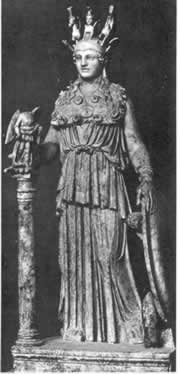
Athena Parthenos, Greek goddess of Wisdom. (Parthenos
means Virgin). This statue reproduces, with a slight variation in
posture, the celebrated Athena Parthenos by Phidias in the Parthenon.
The huge statue, approx. 42 feet tall, dominated the interior
of the Parthenon in Athens, Greece. She held a shield upright
with a snake coiled within it; the other hand held a Nike (Victory).
Phidias' massive statue of Athena stood in the Parthenon 438 BCE until
429 CE, a total of 867 years.The reproduction above is 2nd
century CE. Athens Museum. New Larousse Encyclopedia
of Mythology, p. 107
Athena's dress was covered in gold,
the value of which in today's dollars would be $12,000,000.
(see Footnote 26)
 Here
is a full sized reproduction of Athena-
Here
is a full sized reproduction of Athena-
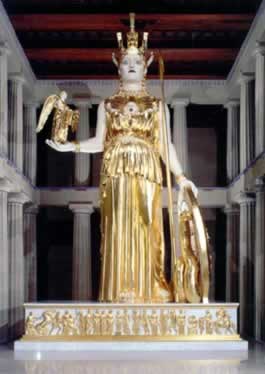
This
full-scale replica of Athena Parthenos, Greek goddess of Wisdom,
is 41 feet 10 inches tall and weighs 12 tons. The goddess of
victory (Nike) in Athena's right hand is 6 feet 4 inches tall. (see
Footnote 27 ref Athena statue)
Located in Nashville, TN, Athena Parthenos is the centerpiece of a
full scale replica of the ancient Parthenon.
(see Footnote 28 ref Parthenon, Nashville)
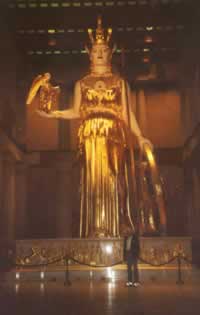
Here is Evan Randolph
(lower right) standing in front of 42 foot statue of Athena
in the Parthenon, Nashville. Note how Evan's Nike sneakers lit up
for the occasion.
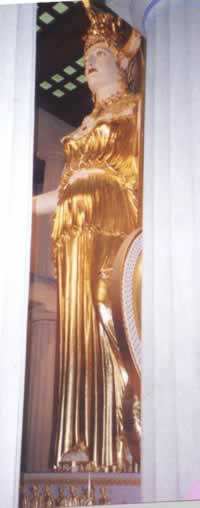
42 foot Athena
as seen from the side between the pillars of the Parthenon, Nashville.
 IN
ANCIENT GREECE- ATHENA, GODDESS OF WISDOM, WAS WELL KNOWN-
IN
ANCIENT GREECE- ATHENA, GODDESS OF WISDOM, WAS WELL KNOWN-
 Plato
(429-348 BCE) states that the Goddess Athena is both "...a
lover of war and a lover of wisdom..." (see Plato Timaeus
24d- footnote 29).
Plato
(429-348 BCE) states that the Goddess Athena is both "...a
lover of war and a lover of wisdom..." (see Plato Timaeus
24d- footnote 29).
Plato Cratylus 407a-b - "The ancients seem to have had
the same belief about Athena as the interpreters of Homer
have now; for most of these, in commenting on the poet, say that he
represents Athena as mind (nous) and intellect (dianoia); and
the maker of names seems to have had a similar conception of her,
and indeed he gives her the still higher title of "divine
intelligence" (hê theou noêsis), seeming to
say: This is she who has the mind of God (Theonoa)..."
(see footnote 29)
Plato wrote about wisdom in a female
context; she can be found in all her purity in the other world, where
the souls go after death. (Plato, Phaedo, The Harvard Classics
1909, p. 57)
 800 BC- The
Greek goddess of Wisdom Athena appeared 162 times in HOMER'S
ODYSSEY. She came down from heaven and provided significant help
to Odysseus in his earthly travails. (see footnote 30)
800 BC- The
Greek goddess of Wisdom Athena appeared 162 times in HOMER'S
ODYSSEY. She came down from heaven and provided significant help
to Odysseus in his earthly travails. (see footnote 30)
It is interesting that Athena & Odysseus planned the recovery
of Odysseus's wife and home on Apollo's grand festal day (Odyssey
20:307). This change around of Odysseus's fortunes, long in decline
and now on the upswing, occured at the Winter Solstice, then December
25th--Apollo's festal day! (see Footnote 31).
Apollo was a sun god, a healer-god, the god of divination and
prophecy, shepherd-god, in addition to archer-god
(New Larousse Encyclopedia of Mythology- pg 113) and was born on December
25th, the winter solstice.
[NEW DATA]-- Jewish-Hellenic
Biblical writers incorporated Homer's Odyssey directly into
the Wisdom of Solomon 4:10 - 5:22 (in
the Septuagint)
Athena, Greek goddess of wisdom,
who played such a key role in saving Odysseus in the Odyssey,
now reappears as Divine Wisdom in the Jewish-Hellenic Wisdom texts.
Click for supporting documentation--[THIS
IS A NEW FINDING- NOT LISTED ON GOOGLE]
CONLUSION REF WISDOM TEXTS:
JEWISH-HELLENIC DIVINE WISDOM = ATHENA, GREEK GODDESS
OF WISDOM
"Christian antipathy to paganism is ungrateful,
since it derives every element of its theology, ritual and symbolism,
along with its sacred scriptures, from that source; it reconstructed
its entire dogma over the model of pagan, that is, of Platonic and
Aristotelian philosophy; it has perpetuated the celebration of most
of the pagan religious festivals; and, finally, it has adopted, as
its own policy, the pagan emphasis on esotericism." See footnote
32
 Early
Christians destroy Athena's statue in the Parthenon in 429 CE
Early
Christians destroy Athena's statue in the Parthenon in 429 CE
Athena installed in her Temple the Parthenon in Athens in 438
BCE, atop the Acropolis. (see footnote 33)
Athena remained enshrined inside the Parthenon until 429 CE (a total
of 867 years), when "The Temple of Goddess Athena (Parthenon)
on the Acropolis of Athens is sacked." (see Footnote 34)
"The Christians, under the emperor Theodosius II, removed
the statue to Byzantium, where it was stripped of its
gold and destroyed without a trace." (see Footnote 35)
Statement 5
 527-565
CE- CHRISTIAN ROMAN EMPEROR JUSTINIAN
(RULING FROM CONSTANTINOPLE) EMBRACED CLASSICAL GREEK THINKING---he
rebuilt the magnificant church Hagia Sofia (Divine Wisdom) in Constantinople
which was described at the time using thinly veiled references to
Athena.
527-565
CE- CHRISTIAN ROMAN EMPEROR JUSTINIAN
(RULING FROM CONSTANTINOPLE) EMBRACED CLASSICAL GREEK THINKING---he
rebuilt the magnificant church Hagia Sofia (Divine Wisdom) in Constantinople
which was described at the time using thinly veiled references to
Athena.
Click here for supporting documentation
 630
CE- ATHENA'S TEMPLE NAMED AFTER DIVINE WISDOM--
630
CE- ATHENA'S TEMPLE NAMED AFTER DIVINE WISDOM--
"The most important symbol of Greek heathenism, the Parthenon,
was changed in the seventh century into a church for Aghia Sophia,
the divine wisdom..."
(see footnote 40)
This shows beyond any doubt that the Christian
Church linked Divine Wisdom to Athena.
"It is by no means coincidence that the chief temples of Pagan
Athens and Christian Constantinople were both dedicated to Wisdom.
The Parthenon as the shrine of the Goddess Athena, Goddess of Wisdom,
and Justinian's Great Church both showed respect for "Sophia"
which has always been one of the chief traits of the Greek mind."
(see footnote 41)
The
Return of Athena--- reclaiming our universal protectress
CONSTANTINE'S
TRINITY DOCTRINE INCORPORATED ATHENA AS THE HOLY SPIRIT
FOOTNOTES:
Footnote 1
http://encyclopedia.laborlawtalk.com/Constantine_I_(emperor)
Footnote 2
http://en.wikipedia.org/wiki/Vestal_Virgin
Footnote 3
http://en.wikipedia.org/wiki/Palladium_%28mythology%29
Footnote 4
http://www.musesrealm.net/rome/timeline.html
Fotnote 5
http://www.architectour.com/1.htm
Footnote 6
http://myweb.lmu.edu/fjust/Rome-ArchConst.htm
Footnote 7
http://www.historyforkids.org/learn/romans/art/archconstantine.htm
Footnote 8
Click Footnote 6--same source
Footnote 9
http://sights.seindal.dk/sight/299_Arch_of_Constantine-2.html
Footnote 10
http://www.yasou.org/byzantium/byz.htm
Footnote 11
http://www.sisantours.com/hag_sop.html
Footnote 12
http://www.omhros.gr/Kat/History/Rel/Mos/Istanbul.htm
Footnote 13
http://gd.cnread.net/cnread1/ewjd/g/gibbon/hor/065.htm
Footnote 14
http://www.geocities.com/constantine325ist/early.html
Footnote 15
http://www.antipas.org/books/trinity/trinity1.html
Footnote 16
http://www.gutenberg.org/dirs/etext99/uthyd10.txt
Footnote 17
http://en.wikipedia.org/wiki/Nicene_Creed
Footnote 18
http://www.piar.hu/councils/ecum02.htm
Footnote 19
http://www.kencollins.com/why-07.htm
Footnote 20
http://www.earlychristianwritings.com/text/gospelhebrews-throck.html
Footnote 21
http://www.bible-researcher.com/eusebius.html
Footnote 22
http://www.geocities.com/kibotos2002/feminine.html
Footnote 23
http://bama.ua.edu/~ksummers/cl222/LECT2/tsld002.htm
Footnote 24 (see para 5)
http://www.bellaonline.com/articles/art8904.asp
Footnote 25 (see Orphic Mysteries)
http://www.geoman.com/jim/ancientmystery.html
Footnote 26
http://www.perseus.tufts.edu/cl135/Students/Colin_Delaney/fathena.html
Footnote 27 for Athena statue replica Nashville
http://www.nashville.gov/parthenon/athena.htm
Footnote 28 for Nashville Parthenon replica
http://www.nashville.gov/parthenon/index.htm
Footnote 29
http://www.goddess-athena.org/Museum/Texts/Plato_x.htm
Footnote 30
http://www.goddess-athena.org/Museum/Texts/Odyssey.htm
Footnote 31
http://www.hermes3.net/dec404.htm
Footnote 32 (see quote near end)
http://www.theosophical.org/theosophy/books/rebirth/ch6.html
Footnote 33
http://www.goddess-athena.org/Museum/Temples/Parthenon/index.htm
Footnote 34
http://www.wcer.org/members/europe/Greece/persec.htm
Footnote 35 (see modern date: Dec 4th)
http://www.personal.psu.edu/users/w/x/wxk116/RomanCalendar/dec01.htm
Footnote 36 (see "Literature and the Arts", near bottom)
http://www.greece.org/Romiosini/constple.html
Footnote 37 (see "Literature and the Arts", nearer bottom)
http://www.greece.org/Romiosini/constple.html
Footnote 38
http://86.1911encyclopedia.org/P/PA/PAULUS_SILENTIARIUS_.htm
Footnote 39
http://www.fordham.edu/halsall/source/paulsilent-hagsoph1.html
Footnote 40 (para 2)
http://monolith.dnsalias.org/~marsares/acro/history/medieval.html
Footnote 41 (see "The Church of St. Sophia")
http://www.yasou.org/byzantium/byz.htm
Contact Evan by
email
Evan's
web site on the Holy Spirit - Divine Feminine-









